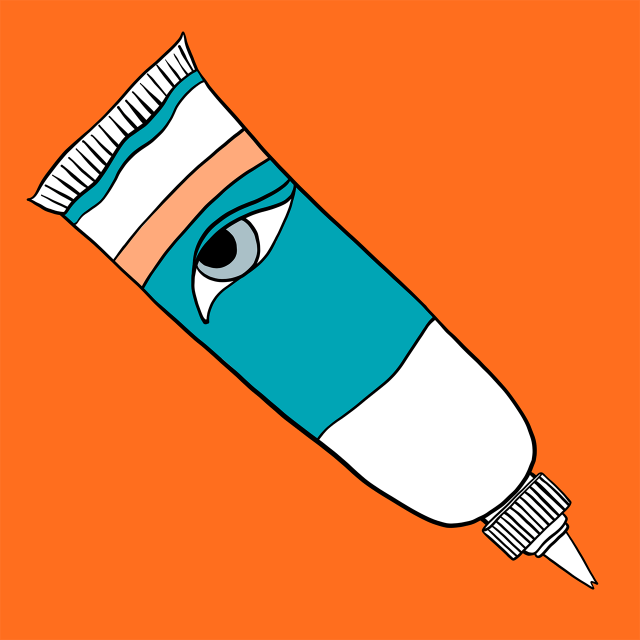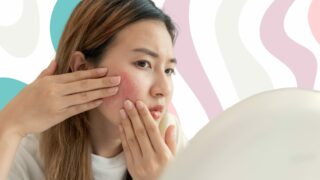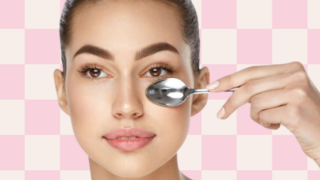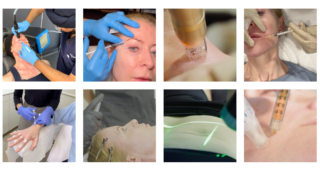Do I need an eye cream?
You don’t have to use an eye cream. Many people don’t bother with eye creams, but there are some fabulous ones around if you want to try them.
Are there tinted eye creams?
Many eye creams are also tinted, which is helpful for covering up dark shadows if you can find a cream the right colour for your skin tone. Eye creams may also contain optical brightening ingredients which help to bounce back the light in a way that blurs wrinkles and reduces the look of dark circles, though you will get a better cover-up effect if you use concealer designed for the purpose.
Does eye cream get rid of puffy eye bags?
In a word, no. No eye cream is going to get rid of eye bags. There are many reasons why eye bags develop – they may be genetic, or they may have crept up on you with age, as the fat pads in the face and around the eye begin to shrivel with age, and the skin above them begins to sag. Or, as the ligaments beneath the eye stretch a little, the fat pads beneath the eye bulge forward into a pouch. Either way, it is going to take more than an eye cream to sort them out (you are talking about tweakments, or possibly surgery), but using the right eye cream – something that is lightweight and hydrating, and which will boost collagen production around the eye to keep the skin firm, will keep the skin heatlhy and strong.
Puffiness in the eye area is usually the result of fluid retention, or allergies. Eating too many salty foods, or drinking too much alcohol are common culprits for making eyes go puffy, particularly if you also sleep with your face squashed into the pillow.
Using a lightweight, hydrating eye cream will help to keep the skin healthy and firm, and if you tap gently around the edges of the eye socket with your ring fingers as you apply your eye cream, this may help lymphatic drainage in the eye area, which will help reduce puffiness. The old trick of gently rolling and pressing the backs of chilled teaspoons across puffy eye bags can help reduce them, too. The high-tech version of this is to use a mini microcurrent device with an eye serum to stimulate the tiny muscles around the eye, and wake up your natural lymph drainage mechanisms.
Another claim you may have seen made about eye creams is that eye creams containing caffeine ‘wake up’ the skin – this isn’t actually true. The caffeine, if it gets into the skin (and I say if because there’s little evidence that the caffeine actually manages this), has an anti-inflammatory effect, which may make dark circles and puffiness less obvious.
Do eye creams work?
Yes they do – but it depends what you want them to do – they can’t work miracles. Eye creams can reduce the appearance of wrinkles by hydrating the skin to plump it up and to slow the rate at which new wrinkles form. For starters, well-hydrated skin beneath the eye may appear less dark than dehydrated skin.
In terms of helping with dark circles, while eye creams can’t get rid of these completely, they can reduce their appearance in a few ways. The inclusion of peptides and retinoids in eye creams helps here: peptides are like tiny messengers within the skin which activate particular processes in it, such as creating the building blocks of firmer skin (such as fibrillin) – this helps the skin to appear less wrinkled. Retinoids will stimulate the production of collagen, which will make the skin thicker and firmer. So thicker, firmer, better hydrated skin around the eyes will look better, and may reduce the appearance of dark circles, though it’s not going to get rid of them.
Secondly, many eye creams contain light-reflecting particles and skin-coloured tints, which both help to make the under-eye area appear less dark – although a concealer will do the job better.
How well an eye cream will work for you also depends on the types of eyes you’ve got – for example, puffy eyes that are sensitive and will swell up if you put too heavy a cream on them will particularly benefit from a lightweight specialised eye product.
Where to apply eye cream
Read the instructions on your specific eye cream – some creams are meant to be applied just under the eye and around the outer edges (where crows’ feet form), but some are meant to be applied to the eyelids as well. If you don’t have the instructions and aren’t sure where to apply it, I’d advise being cautious and leaving out the eyelids.
Why does my under eye cream burn?
This sounds like a problem – your eye cream should not sting or burn. If it does, stop using it immediately. Burning or stinging could be caused by one of two things: either fragrance in the product (parfum) causing an irritant reaction to the skin around the eyes (although most eye creams tend to be fragrance-free), or applying too much product, to the point where it gets too close to the eyes, gets picked up by the eyelashes and gets into the eyes. If this happens, it can really hurt, and you should rinse your eye thoroughly, preferably with cooled boiled water.
Can eye cream cause dry eyes?
It shouldn’t. It’s supposed to be hydrating the eye area – however, while this is unusual, it could be part of an irritant reaction if your eye cream contains fragrance (listed as ‘parfum’ in the ingredients list). Most eye creams, however, are fragrance-free, in part because of their potential to irritate the eyes.This could also be due to allergies, separate from use of the eye cream.
What is the best eye cream?
The best eye cream for you is the one that suits your budget, doesn’t irritate your eyes, and produces the effects you want – whether that is reduced wrinkling, better hydration, or firmer, less puffy skin.
Have a look at the shop on my website for some of my favourite eye creams. Or book in for a one-to-one consultation with TTG’s skincare Shenaz for personalised recommendations.












 The Tweakments Chatbot
The Tweakments Chatbot